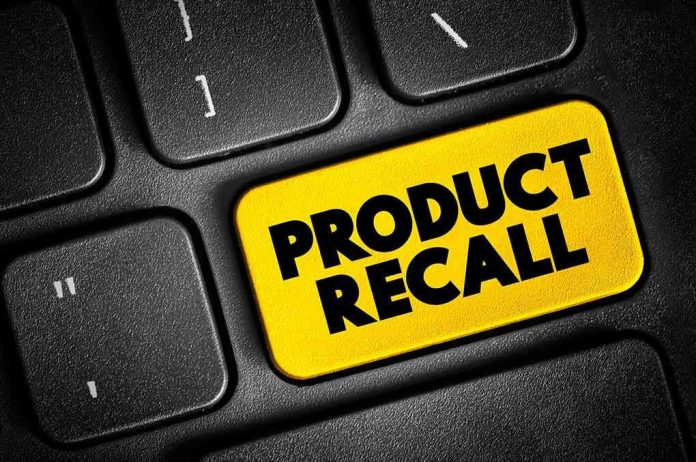
One mislabeled box in the supermarket freezer can turn a routine grocery run into a high-stakes game for millions with food allergies—Aldi’s latest recall is more than a PR slip; it’s a siren call about the fragile trust consumers place in food labeling.
Story Snapshot
- Aldi issued a nationwide recall of Fusia Asian Inspirations Veggie Spring Rolls due to undeclared shrimp, posing a serious allergen threat.
- No illnesses have been reported, but the recall is a stark reminder of the risks lurking behind mislabeled foods.
- Industry protocols and rapid response prevented a potential disaster, highlighting the effectiveness and limitations of current food safety measures.
- The event exposes systemic gaps in supply chain vigilance and underscores why allergen labeling is a frontline issue for American families.
How a Packaging Error Threatened Consumer Safety Nationwide
Aldi, an icon among value-focused shoppers, pulled Fusia Asian Inspirations Veggie Spring Rolls off shelves from coast to coast. The culprit: shrimp, stealthily tucked into spring rolls labeled vegetarian, its presence undeclared and potentially perilous for anyone with a shellfish allergy. The error originated not in a distant factory’s recipe, but in a simple packaging mix-up by supplier Tai Foong USA. For people with shellfish allergies, “undeclared shrimp” is not a bureaucratic footnote. It’s a red alert, a reminder that one bite can trigger life-threatening reactions. The recall’s scope—nationwide, one SKU, one brand, one label—hints at both the strength and the fragility of our food system’s safety nets.
Consumers heard the news before anyone got hurt. No allergic reactions, no emergency room visits—just a flurry of shoppers checking their freezers and a corporate promise of refunds. The recall was swift, but the underlying problem is hardly new. Food recalls due to undeclared allergens are a recurring headline, and each incident chips away at the trust Americans place in the words printed on a box.
Inside the Recall: Who Acts, Who Decides, and Who Pays
Aldi and Tai Foong USA didn’t hesitate. The recall was not only a logistical scramble—remove affected products from every store, notify customers, coordinate with the FDA—but also a reputational stress test. Aldi’s protocols favor speed and transparency; Tai Foong USA, facing scrutiny, had to trace the error to its source and assure both retailer and regulator that fixes were in place. The FDA’s oversight ensured public notification met federal standards. Meanwhile, for consumers, the stakes were deeply personal. The difference between a safe meal and a medical emergency hinged on a single line in the ingredient panel—a line that, this time, was missing.
Aldi Just Recalled a Popular Frozen Item Sold Nationwide—Here’s What to Know – EatingWell https://t.co/wd5AqrHy4n via @GoogleNews
— Johnnie M. Brown (@JohnnieMaeBrown) October 10, 2025
Food industry recalls are as much about perception as prevention. When the process works—no illnesses, clear communication, refunds—it can reinforce faith in the system. Still, each recall is a costly lesson. Aldi and its supplier absorb the financial hit: product waste, refunds, operational disruption. But they also face something harder to quantify—a test of their standing with customers who expect, above all, to be safe.
A History of Recalls: Lessons Repeated, Risks Reassessed
This isn’t Aldi’s first brush with allergen mislabeling. Previous recalls—from vitamins tainted with peanuts to chicken fried rice containing undisclosed milk—prove that even established safety protocols are sometimes tripped up by human error or lapses in oversight. The recurrence of such incidents industry-wide speaks to the challenge of managing complex supply chains where one misstep can have national consequences. Studies confirm that undeclared allergens are a leading cause of food recalls in America, often triggered by packaging mix-ups that evade even the most rigorous quality checks.
The Fusia recall, like its predecessors, is a wake-up call for every stakeholder: suppliers must double down on packaging controls, retailers need airtight recall protocols, and regulators must fine-tune oversight to keep pace with evolving risks. For consumers, the lesson is less about panic, more about vigilance. Reading every label is no longer just good advice—it’s a critical safeguard in an imperfect system.
The Ripple Effect: Industry Change and Consumer Trust
Recalls are disruptive, but they’re also instructive. Aldi’s handling of the spring roll crisis set a benchmark for rapid response: public statements, nationwide product removal, and a clear path for customer refunds. Yet the event’s real legacy may be its impact on industry standards. Expect other retailers and suppliers to revisit their own controls, spurred by the knowledge that a single error can trigger a national crisis. The economics are straightforward—recalls cost money, lost sales, and damaged reputations. The social impact is subtler, reinforcing a shared expectation that food safety is non-negotiable.
For the 32 million Americans with food allergies, these episodes are more than headlines—they’re a daily reality. Each recall is a reminder of the invisible risks that come with every grocery trip. The Fusia recall’s greatest success was not in avoiding disaster, but in revealing just how close the line can be between routine and emergency. It’s a lesson the industry—and consumers—can’t afford to forget.
Sources:
AOL: Aldi Just Recalled a Popular Frozen Item Sold Nationwide—Here’s What to Know
Aldi Newsroom: Product Recalls
AOL: Aldi Issues Urgent Recall Frozen Spring Rolls












